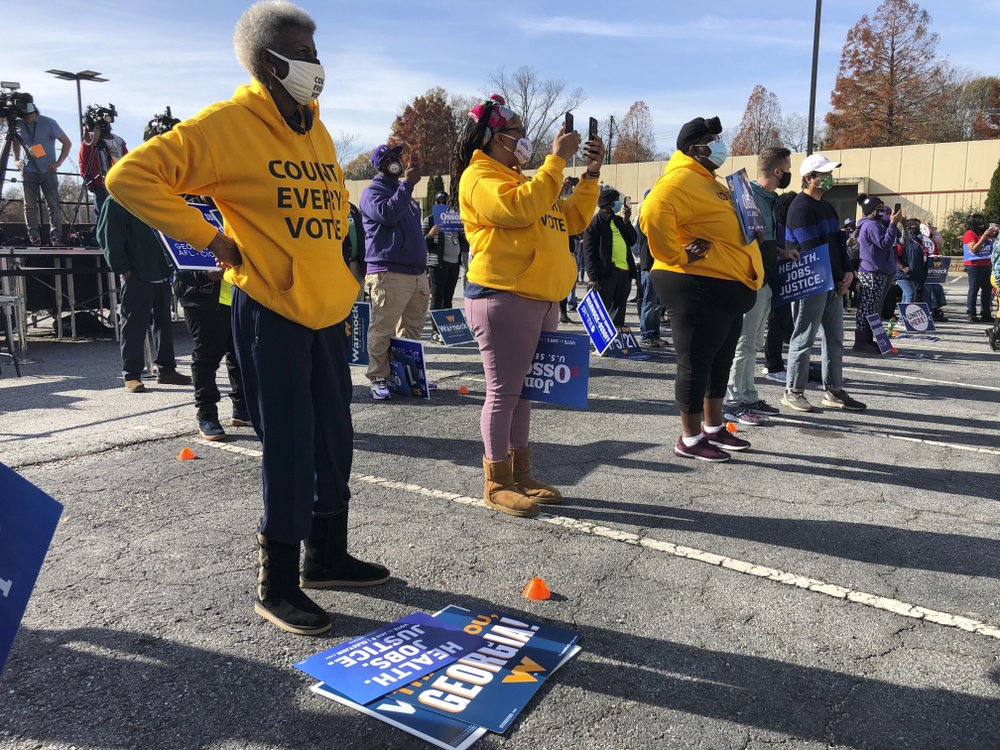Early in-person voting begins in Georgia Senate runoffs
'It’s very important,' Democrat Raphael Warnock. 'It’s how we won in the general and it’s how we’re going to win in the runoff'
What could be the main event in Georgia’s twin U.S. Senate runoffs — early in-person voting — begins Monday.
More than half of the record 5 million votes in the Nov. 3 general election were cast during its two-week early voting period. Early in-person voting could be even more important in these Jan. 5 runoffs because of the short time frame for voters to request and send back ballots by mail, as the two races decide which party will control the U.S. Senate.
“It’s very important,” Democrat Raphael Warnock, who is challenging Republican U.S. Sen. Kelly Loeffler in one of the races, said Friday after a speech to labor union canvassers. “It’s how we won in the general and it’s how we’re going to win in the runoff.”
Read More: Loeffler says there ‘isn’t a racist bone’ in her body at debate, refuses to say Trump lost election
No one expects turnout to be as high in the Warnock-Loeffler contest or the race between U.S. Sen. David Perdue and Democrat Jon Ossoff. But Bernard Fraga, an Emory University professor who studies voting, said overall turnout could reach 4 million.
Gabriel Sterling, election system implementation manager for the Georgia Secretary of State, said he expects a surge of people on Monday. More than 125,000 people cast ballots in October on the first day of early in-person voting before the general election. Some Atlanta-area early voting sites in October and November saw people lined up for hours.
“As always, on the first day of early voting, it’s kind of like when the iPhone comes out,” Sterling said last week. “People want to go get the new iPhone at the Apple store. They’re going to stand in line for a while.”

One question is how many mail-in ballots will be cast in the election. By Friday, 1.2 million mail-in ballots had been requested and 200,000 returned. In the general election, Democrat Joe Biden won 65% of the 1.3 million absentee ballots that were returned in Georgia, a record fueled by the coronavirus pandemic.
More than 86,000 voters who did not vote in November had requested ballots as of Friday, according to state elections data analyzed by Michael McDonald, a University of Florida professor who tracks voting.
Fraga said it’s possible that mail-in ballots, if anything, will be even more favorable for Democrats in the runoff because of attacks on the integrity of mail-in voting by President Donald Trump and many Georgia Republicans.
“I don’t think Republicans are going to be voting by mail even at as high of rates as they did in November,” Fraga said.
That means early in-person voting, which Trump narrowly won in November, could be even more important for Republicans. Both parties may also drive voters toward the early polls with Christmas and New Year’s holidays looming before Jan. 5.
“Any compressed timeline means people will be less likely to vote by mail,” Fraga said.
Each of Georgia’s 159 counties must offer at least one location for early voting during business hours, with many in metro Atlanta offering multiple locations, extended hours and weekend voting. Early voting will continue through Dec. 31 in some places.

Preparation for early voting has been marred by squabbles over cuts to the number of early polling places.
Cobb County, once a suburban Republican stronghold trending Democratic, planned to cut early polling places from 11 to five. The county election manager said employees are exhausted and she didn’t have enough to staff more than that. After an outcry that closures would harm Black voters, the county said it would open two more locations and relocate a third.
Heavily Republican Forsyth County is cutting early voting locations from 11 to five and cutting hours, rejecting on Tuesday an effort to expand sites. Elections Director Mandi Smith told The Atlanta Journal-Constitution that with a shorter ballot and fewer voters expected, 11 sites aren’t needed. Asian Americans Advancing Justice-Atlanta said the move will make lines longer and voting harder for people who don’t speak English well.
Forsyth Republicans applauded the move, saying on the party Facebook page that the county rejected the “Democrats scheme” for more sites. The GOP reasoned that even early in-person voting is prone to cheating, although it didn’t explain how, with voters required to appear in person with photo identification.
Read More: Ossoff forced to debate empty podium after Perdue refuses to show
“We fought to protect the integrity of our elections and not allow opportunities for more fraud,” the party wrote.
Republican Hall County, with a large Latino population, is cutting early voting sites from eight to four. Democratic Douglas County will also have fewer voting sites.
The Center for New Data, a nonprofit group, counted 42 early polling sites statewide scheduled to close for the runoff. In some cases, polling places are being relocated nearby.
The center found voters at polling locations slated to close waited an average of 49 minutes before the general election, compared to an average of 43 minutes at locations staying open.
Have you subscribed to theGrio’s new podcast “Dear Culture”? Download our newest episodes now!
TheGrio is now on Apple TV, Amazon Fire, and Roku. Download theGrio today!
More About:Politics

